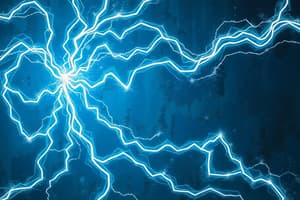Podcast
Questions and Answers
What is the unit of measurement for voltage?
What is the unit of measurement for voltage?
- Joules
- Volts (correct)
- Amperes
- Ohms
Which of the following correctly describes the formula for voltage?
Which of the following correctly describes the formula for voltage?
- V = R / I
- V = P / Q
- V = I × R
- V = W / Q (correct)
What drives the movement of electrons in a circuit?
What drives the movement of electrons in a circuit?
- Power
- Current
- Voltage (correct)
- Resistance
Which type of voltage remains constant and flows in one direction?
Which type of voltage remains constant and flows in one direction?
What instrument is used to measure voltage in a circuit?
What instrument is used to measure voltage in a circuit?
Flashcards are hidden until you start studying
Study Notes
Definition of Voltage
-
Basic Concept:
- Voltage, also known as electric potential difference, is the measure of electrical potential energy per unit charge.
-
Unit of Measurement:
- Voltage is measured in volts (V).
-
Formula:
- Voltage (V) = Energy (Joules) / Charge (Coulombs)
- V = W/Q, where W is work done and Q is charge.
-
Function:
- Voltage indicates the ability of an electric field to do work on a charged object.
- It drives the movement of electrons in a circuit, creating an electric current.
-
Types of Voltage:
- Direct Voltage (DC): Constant voltage in one direction.
- Alternating Voltage (AC): Voltage that varies in magnitude and direction over time.
-
Voltage Sources:
- Common sources include batteries, generators, and solar cells.
-
Relation to Current and Resistance:
- Ohm’s Law: V = I × R
- V = Voltage (volts)
- I = Current (amperes)
- R = Resistance (ohms)
- Ohm’s Law: V = I × R
-
Measurement:
- Voltage is measured using a voltmeter, which can be connected in parallel to a circuit component.
-
Importance:
- Voltage is critical for the operation of electrical devices, determining how much current will flow in a circuit based on the circuit’s resistance.
Definition of Voltage
- Voltage is the measure of electrical potential energy per unit charge, often referred to as electric potential difference.
- The standard unit for measuring voltage is volts (V).
- The formula to calculate voltage is V = W/Q, where V is voltage, W is work done in joules, and Q is charge in coulombs.
- Voltage indicates the capability of an electric field to perform work on a charged particle, driving electron movement and generating electric current.
Types of Voltage
- Direct Voltage (DC) maintains a constant value and flows in one direction.
- Alternating Voltage (AC) varies in both magnitude and direction over time, commonly used in household electricity.
Voltage Sources
- Common sources of voltage include batteries, generators, and solar cells, each providing a different type of voltage for various applications.
Relation to Current and Resistance
- Ohm’s Law states that voltage (V) is equal to current (I) multiplied by resistance (R) in a circuit, expressed as V = I × R.
- Understanding the relationship between voltage, current, and resistance is essential for analyzing electrical circuits.
Measurement
- A voltmeter is required to measure voltage, typically connected in parallel to the component of the circuit being tested.
Importance
- Voltage is crucial for the functionality of electrical devices, influencing how much current flows through a circuit in accordance with the circuit's resistance.
Studying That Suits You
Use AI to generate personalized quizzes and flashcards to suit your learning preferences.



